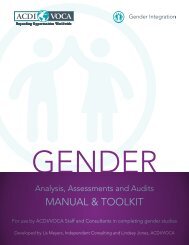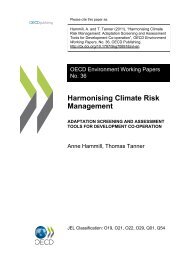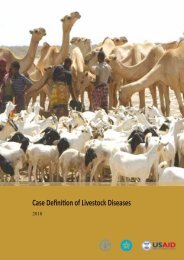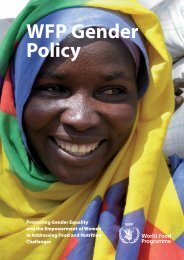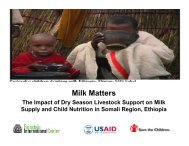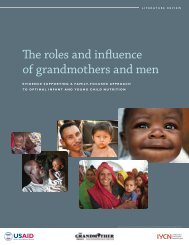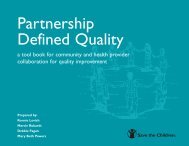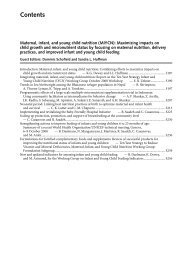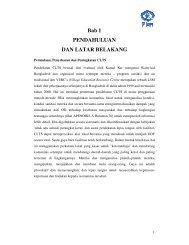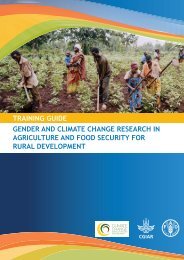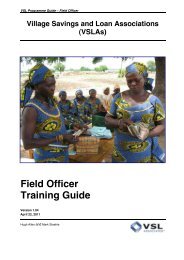Module 2. Theorethical Concepts of Gender - FSN Network Portal
Module 2. Theorethical Concepts of Gender - FSN Network Portal
Module 2. Theorethical Concepts of Gender - FSN Network Portal
Create successful ePaper yourself
Turn your PDF publications into a flip-book with our unique Google optimized e-Paper software.
Mainstreaming <strong>Gender</strong> into Water, Sanitation and Hygiene (WASH) Programs<br />
<strong>Module</strong> 2: Theoretical <strong>Concepts</strong> <strong>of</strong> <strong>Gender</strong><br />
Lesson 8: Social Vulnerability and WASH<br />
A World Bank (1996) review <strong>of</strong> 121 rural water supply projects found that<br />
women’s participation was among the variables most strongly associated with<br />
project effectiveness. Furthermore, it was found that the failure to take gender<br />
differences and inequalities into account can result in failed projects. The<br />
study found that the benefits <strong>of</strong> involving women are: reduced corruption,<br />
increased transparency, better financial management and empowering<br />
women by example.<br />
In the peri-urban areas <strong>of</strong> Malawi, female participation in water management<br />
has been shown to be very constructive (Rathgeber, 2003). At first, male<br />
managers were put in charge <strong>of</strong> the communal water points. However, this<br />
was found to be ineffective, as the men were absent during the day and<br />
lacked service orientation and financial management skills. A new<br />
management group, consisting only <strong>of</strong> women, was set up and both water and<br />
sanitation management improved significantly. However, this was a heavy<br />
burden for the women, and the programme now follows an equitable strategy<br />
where the management group consists <strong>of</strong> men and women and where the<br />
burden <strong>of</strong> work and influence is shared equally.<br />
A ‘business case’ can be made for the economic value <strong>of</strong> introducing gender<br />
mainstreaming, as when women are incorporated into management, work is<br />
more effective.<br />
The World Bank (1996) has brought research and experience from its own<br />
extensive operations in water and sanitation together into a tool kit. The Bank<br />
summaries the lessons <strong>of</strong> experience in this area as follows:<br />
• <strong>Gender</strong> is a central concern in water and sanitation.<br />
• Women’s participation improves project performance.<br />
• Specific, simple mechanisms must be created to ensure women’s<br />
involvement.<br />
• Attention to gender analysis must start as early as possible.<br />
• <strong>Gender</strong> analysis is integral to project identification and data collection.<br />
• A learning approach is integral to project identification and data<br />
collection.<br />
• Projects are more efficient when both men’s and women’s preferences<br />
about hardware are addressed.<br />
• Women and men promote project goals through their use <strong>of</strong> both<br />
traditional and non-traditional roles.<br />
• Women’s groups and NGOs can be effective in involving women.<br />
• <strong>Gender</strong>-related indicators must be included when assessing project<br />
performance and impact.<br />
A Training Manual for Water Pr<strong>of</strong>essionals developed collaboratively by PROTOS and SNV, 01/02/2007<br />
<strong>2.</strong>54



